
RIJEKA
WITH SHIP
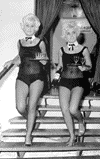 It
was one of the happier seas amongst seas, an archipelago of
the youth. We have sailed tied to the solid waterfronts, wrapped
up in the security of the breakwater, sometimes in Opatija,
other times in Rijeka, wherever, out of reach of the winds,
bosses and wives... Inside our imagination. Inside the yearning
for something that never happens. From one nightfall to another,
from the anxious departure, until the dawn, but before the
dawning itself. And so we came back home somehow emptier.
However, night is the game, nocturnal people are players,
and players are the boys. It
was one of the happier seas amongst seas, an archipelago of
the youth. We have sailed tied to the solid waterfronts, wrapped
up in the security of the breakwater, sometimes in Opatija,
other times in Rijeka, wherever, out of reach of the winds,
bosses and wives... Inside our imagination. Inside the yearning
for something that never happens. From one nightfall to another,
from the anxious departure, until the dawn, but before the
dawning itself. And so we came back home somehow emptier.
However, night is the game, nocturnal people are players,
and players are the boys.
And so those late birds happened to catch an early milk. It
was shameful to come home when neighbours already leave for
their jobs, so someone thought that the neighbours' opinion
can be changed only if the impression is changed. Don't be
a late bird, be an early riser. And so they would snatch a
milk bottle from the metal crates that dispatchers left lying
in front of stores, and brought it home as the visible justification
of the watch-hand's position. And then sleepy wives started
to murmur to their somnolent husbands. See, he fetches milk
home before going to work, perhaps he is already preparing
the lunch...
It was such a phase in life, we were onboard.
SHIP
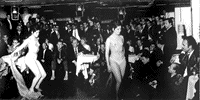 Ship.
'Barba Rude'. It never occurred to anyone that it could have
had a more attractive name. 'Rude!? As if it is a quote from
some stupid joke. Without spice, without beer. Without whoredom.
However, this name was born in between two drinks, amongst
godfathers, in homage of someone who was called that way,
baptised at once. Well, even God created a world once and
never changed his mind since. Although he certainly had abundant
reasons to do so. Ultimately, that name never bothered anyone.
We have got used to it, accepted it, adopted it and had it
while it lasted. Ship.
'Barba Rude'. It never occurred to anyone that it could have
had a more attractive name. 'Rude!? As if it is a quote from
some stupid joke. Without spice, without beer. Without whoredom.
However, this name was born in between two drinks, amongst
godfathers, in homage of someone who was called that way,
baptised at once. Well, even God created a world once and
never changed his mind since. Although he certainly had abundant
reasons to do so. Ultimately, that name never bothered anyone.
We have got used to it, accepted it, adopted it and had it
while it lasted.
Before it was kidnapped and taken away to a breaker's yard,
'Barba' had different names and a different history. For decades
it was dragging along its' routes, persistent and weary, through
the channel below Mt Velebit, from Susak to Jablanac, from
Novigrad to Obrovac at the end of the world. It survived all
the windy storms and monotonous calms, all the stews and minestrones
from the ship's kitchen, all those bundles of onions and ham...
And it survived without those things as well. Under Mt. Velebit,
the old boat slowly and unavoidably delivered mail and life,
brought and took away things and people from the rocky crags,
those that departed in search of a better life, and those
that came to rest after that better life.... Then also - as
ever - passengers used to wash their throats with drinks,
during those long journeys, hiding in lee, between bales and
barrels upon the ship's deck. Slowly, mile after mile, in
that era when nobody could know whether bare-bottomed ladies
would ever dance in front of us, the devilish ship dragged
entertainment and song of the poor people with itself.
NEW LIFE
After
the first death, worn-out, rusty and rejected, the ship lived
to experience another birth. It was resurrected and sailed
into its' new life, again filled with song, entertainment,
joys and escapes from reality. Into the night.
Then, rowdies courted women, spitting on the deck and state,
waving dreams of the far lands and another world that was
different from their own. The same as later, when the nightlife
gave rise to illusions. And, the same before, when the ship
announced the end of the journey, the last port, passengers
would feel a sting in their hearts: return home, a little
bit of guilt, a little bit of anxiety.
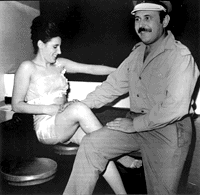 When they took out the old ship's
entrails, inside the emptiness
of what was once the stokehold and lever of the steam machine,
and further on, inside the vacancy of the ex-ship's saloon,
they erected the bar and podium with tables. There was nothing
left to remind of the stokers, greasers, boatswains and machinists.
If anyone even recalled it, it didn't care at all. There was
music, drink, dancing and everyone sailed on, far away. In
the very bottom, beneath the podium, tons of concrete was
poured, to strengthen the shakedown. When winds stormed from
the south so powerfully that the sea climbed onto the breakwater,
all the ships in the harbour swayed, except 'Barba Rude'.
It was more motionless than the others... Like any other ship,
'Barba' was also dragged to a regular naval inspection. Everything
that sails has to be regularly inspected. Everything that
walks is allowed to totter, fall and rave on, as well. When they took out the old ship's
entrails, inside the emptiness
of what was once the stokehold and lever of the steam machine,
and further on, inside the vacancy of the ex-ship's saloon,
they erected the bar and podium with tables. There was nothing
left to remind of the stokers, greasers, boatswains and machinists.
If anyone even recalled it, it didn't care at all. There was
music, drink, dancing and everyone sailed on, far away. In
the very bottom, beneath the podium, tons of concrete was
poured, to strengthen the shakedown. When winds stormed from
the south so powerfully that the sea climbed onto the breakwater,
all the ships in the harbour swayed, except 'Barba Rude'.
It was more motionless than the others... Like any other ship,
'Barba' was also dragged to a regular naval inspection. Everything
that sails has to be regularly inspected. Everything that
walks is allowed to totter, fall and rave on, as well.
PEOPLE
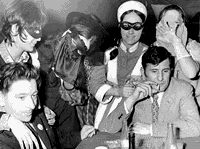 During
those years, we have wandered in Rijeka's sticky nights, without
inspection, more or less with no use, and even more without
a goal in its' definite sense. While a boat was located in
Opatija, its distance was measured by the number of drivers
and cars in our company. When it was moored in Rijeka, things
changed thoroughly. We would start the night in the Cultural
Workers Club, where different people socialised and assorted;
actors, small part of the theatre audience, journalists, lawyers,
writers, judges, painters and that special kind of person
whose profession or reason you never know, but who are always
around. And then we would move onto the Ship. During
those years, we have wandered in Rijeka's sticky nights, without
inspection, more or less with no use, and even more without
a goal in its' definite sense. While a boat was located in
Opatija, its distance was measured by the number of drivers
and cars in our company. When it was moored in Rijeka, things
changed thoroughly. We would start the night in the Cultural
Workers Club, where different people socialised and assorted;
actors, small part of the theatre audience, journalists, lawyers,
writers, judges, painters and that special kind of person
whose profession or reason you never know, but who are always
around. And then we would move onto the Ship.
Mustafa, ex-boxer, tiny and smiling, good to the good ones
and wicked to the wicked ones, was a porter and represented
the first meeting with the nights on the ship. His short stature
was his big misfortune. Drunken guests were not allowed. The
ship was also invaded by crowds of foreign sailors in a merry
mood. Everyone wanted to see that something 'as from the real
West', which could not be seen anywhere else in the red states.
And so all these people wanted to run over Mustafa in their
attempt to roll down the stairs into the space below deck
- it seemed so easy. However, we who were regular guests,
never cleared up how Mustafa succeed to pile those importunate
individuals on the deck, somewhere behind, out of sight of
a possible night passer-by. At any rate, they would rest there
for a while and then the sooner the better leave the ship,
probably wondering what it is that in this small guy's fists.
However, Mustafa has often mentioned that he is an ex-boxer
and that all the boxers are not allowed to use their fists,
unless they have a license to carry arms. Anyone could talk
to him to one's heart's content, but no-one was allowed to
mention his mother or slap his face.
Two things on 'Barba Rude' were a miracle, considering the
era and the ruling regime. Those were bunnies and striptease.
'Barba Rude' had the first waitresses with bare thighs, in
fishnet stockings and well strutted. And of course, there
was the first striptease show in all of ex-Yugoslavia. Rijeka
was envied by all the male crowds all over the country. Programs
developed in time; at first girls stripped only to their breasts,
then a little bit lower, and after they did it solo - they
started doing it in pairs. Everyone wanted to see this. Then
and there, no-one could imagine that once in the future idle
Rijeka ladies would go to Kostrena to watch male striptease.
Programs upon the ship were consisting of the circus performers,
illusionists, trick-masters in tailcoats, rubber kids and
a few more grown ups also made of rubber.
RUMOURS
All included, everything was there, in sufficient amounts.
And it was good. Barba gained fame. The world did not care
for the restaurant's offer on the deck, although one could
excellently satisfy his or her needs there as well. Everyone
knew of the nocturnal 'Barba'. It was surrounded by fame;
fame got hold of it. 'Barba' divided even politicians. There
were those who realised that a big port such as Rijeka needs
entertainment. Others, as usual, didn't know half the things
they should, but were very eager to take care of the morality.
Others' morality.
Rijeka bars soon engaged lots of striptease girls. Nightlife
blossomed. There was 'Plavi Jadran', 'Klub pomoraca', 'Neboder',
hotel Bonavia's bar. Yet, each of those places pattered after
'Barba', which was so small that any other bar's podium could
hold it entirely. 'Barba' started it all and kept the primacy.
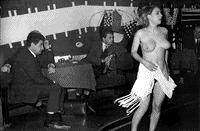 Bunnies, of course, did
not escape from Hefner's magazines
or from the pools of Gouchone's glamour. They were girls from
the inland provinces. Each of them had her own drama and reason;
each had her own dream and often didn't change anything in
her life except dresses and names, as if they covered who
they are and where they work, because it is something noxious.
Some of them disappeared with no trace. Others married and
became mothers, perhaps grandmothers by now. Bunnies, of course, did
not escape from Hefner's magazines
or from the pools of Gouchone's glamour. They were girls from
the inland provinces. Each of them had her own drama and reason;
each had her own dream and often didn't change anything in
her life except dresses and names, as if they covered who
they are and where they work, because it is something noxious.
Some of them disappeared with no trace. Others married and
became mothers, perhaps grandmothers by now.
Although the atmosphere around the ship was charged with promising
electricity, none of the numerous rumours that followed 'Barba'
ever came true, never got realised.
There was no prostitution, and, it seems to me professional
whores were not allowed on the ship, not even as guests. Many
of them fiercely objected to that rule, because the ship seemed
a profitable endeavour. Still, 'captain' Sime Coza and bosun
Mustafa did not care for their protests, although in those
years prostitution played an important role in he town, and
had a numerous formation consisting of many female soldiers.
Despite everything, despite the staff's effort to select the
ship's guests and to preserve the 'ship's reputation of the
decent entertainment place, screams of the journal's titles
followed the ship like seagulls. Rumours told of the ship
being a hotbed of debauchery and immorality, of evil and perversion.
Nobody ever thought or wrote anything similar about the restaurant
at Rijeka's railway station, although night stations were
and still are today, the meeting place of demimonde. And so,
a Belgrade newspaper offer quoted witty journalist Joza Vlahovic's
quibble saying that 'Barba' is the only ship that in the midst
of the harbour doesn't stream the flag, but woman's panties
instead...
In such an atmosphere nobody trusted that 'Barba' is clean.
The police had an eye (and sometimes both eyes) on the ship.
Neither did the Communist party stay silent. Zealous wives
shared their opinion with police and party. And I suppose
it was a unique case in which wives agreed with such parties.
NIGHT
WATERFRONT
And all those Anitas, Rositas, Micheles, and Milkas... all
those bare waitresses, could they count on the interest of
a serious man?
Generally speaking,
'Barba Rude' sailed too soon into the provincial waters of
the Balkan's Yugoslavia. Then and there, we were not up to
fishnet stockings and a basic need for work, even if it was
without stockings and panties. Yet, in the meantime we have
grown up to that point.
Strapping fellows from the inland provinces held 'Barba' in
especially high esteem. For them, it was a ship out of a fairy
tale. And because of them, it was great to see Aisha performing.
Basically, she was a belly dance artist. Nobody swayed with
such a virtuosity and nobody had such winning ways of sitting
on the laps of enchanted men, wrapped up in a mist of silk
and perfume, in a cloud of the oriental woman's mystery. So
much freedom beneath the veil. And Aisha was keen on picking
up exactly those provincial guys... As they turned out hornier,
more ready to give everything they have and to take all of
that in their lap. Aisha would take her veil off graciously,
only to reveal her perfectly shaven male face. Guys faces
would remain dumb stricken for a long time, surrounded by
laughter of the regular guests.
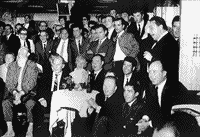 Those who remember 'Barba Rude' have
to remember Sime Coza.
He had a special relationship towards the regular customers,
and towards the pockets of his visitors. He was able to guess,
down to a penny, any customer's 'weight'. And so he was able
to see how much money there is in our always 'hollow' journalists'
pockets (a young man is always short of money, until he grows
old and does not need it anymore). Those who remember 'Barba Rude' have
to remember Sime Coza.
He had a special relationship towards the regular customers,
and towards the pockets of his visitors. He was able to guess,
down to a penny, any customer's 'weight'. And so he was able
to see how much money there is in our always 'hollow' journalists'
pockets (a young man is always short of money, until he grows
old and does not need it anymore).
All of us who have travelled on 'Barba Rude' - if, in the
meantime, we didn't turn into those characters that used to
judge and reprimand us - will remember the ship as a part
of life itself, in which everything was easy and warm. Or
maybe it was because we were young? Puritans tried awfully
hard to stain that small spot on Rijeka's waterfront, foredooming
the visitors and detouring the ship in a big curve. Afterwards,
they fiddled with their secretaries behind the high windows
of their offices. Ordinary people, that usually have faith
in themselves, and do not care about gossip, never avoided
'Barba', nor bunnies and strip-tease girls, nor Aisha. Taking
no notice, they gave spice to this perfume of Rijeka's nights,
to the nocturnal waterfront. To the waterfront during nights.
It was before Rijeka gave its' passengers the waterfront to
be used by Fikret Abdic as the repository for the concrete
iron. It was in the time when the brilliant painter Vladimir
Udatny used to bring his glass of 'Pelinkovac' in the small
pocket of his jacket to the Cultural Workers Club... Once
upon a time, when Barba could be visited by the true lady
Radojka Sverko, accompanied by her husband, after one of her
concerts, dressed casually in her jeans outfit, upon her endlessly
long legs. With no fear that such a visit would make her less
a lady and less an eminent citizen. It was in the time when
'Novi List', leading Rijeka's newspaper introduced a seventh
edition in the week, the so called (red) edition, and had
wit and courage to promote and celebrate such an event upon
the 'Barba Rude', in this pestilent place...
It was Rijeka with a ship. Something at the century's expiration
that could still be measured with the meter of the soul, which
is gone by now.
It is 25 years since Vladimir Udatny is gone. Many people
are gone. There is no more Rijeka that once stood there. Nothing
is left. Everything seems futile and empty. It's lost, past.
Or is it just our years that are past?
------------------------------------------------------------------------
Text by Vladimir Segota
|













